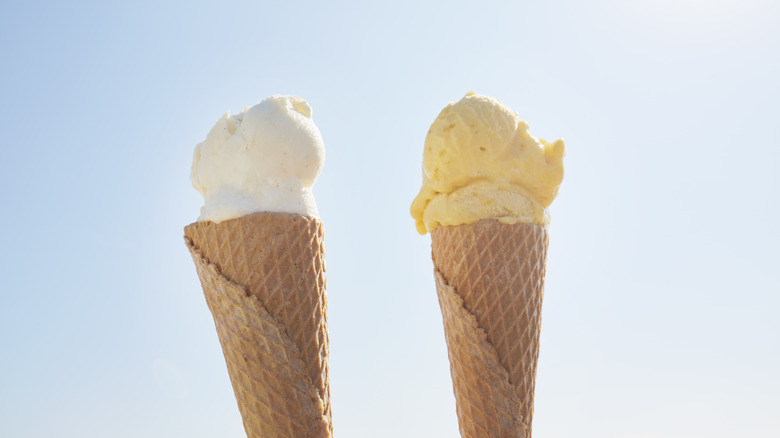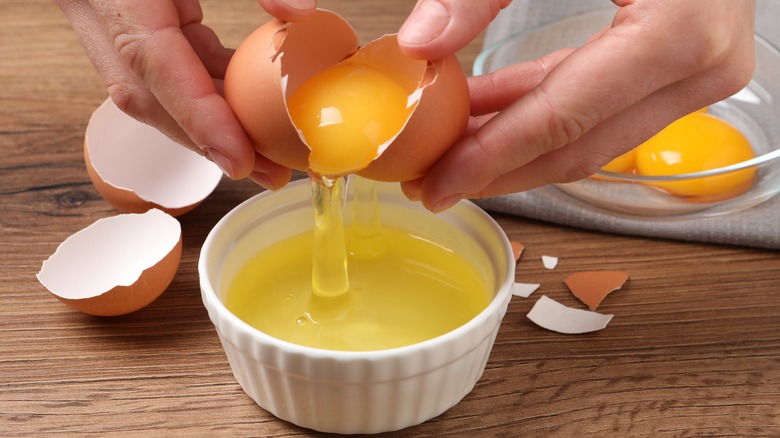What Makes French Vanilla French?
Vanilla, the ur-word for "basic," has an unfair reputation given how dynamic it can be. There are all kinds of vast and varied vanilla varieties, from all over the world and in all different compositions. It can come in precious, pricy pods or as an extract for a few bucks a bottle. Between all of the origins, forms, and possible recipes in creation, you could taste vanilla in infinite ways. Add the word "French" to the arrangement and things only get more convoluted. Vanilla, as you very well understand, is simply a spice; more often than not, "French" vanilla is a marketing play. Unlike, say, Tahitian, Mexican, or Indonesian vanilla beans, there are no French vanilla beans.
Like french fries, French toast, French dressing, and (so sorry to have to be the bearer of this news) French kissing, French vanilla is not necessarily — you guessed it — French. The latter actually bears the closest connection to the nation, but even that is for one dessert's preparation method, rather than any natural origins. That, plus good, old fashioned advertising and Americans' love affair with French style, culture, its je ne sais quoi, and, in this case, food, made the phrase and notional flavor of French vanilla so ubiquitous stateside.
How French vanilla's preparation differs from vanilla's
To interpret "French vanilla" products, you first have to understand that French vanilla ice cream is about as close as you're going to get to real deal French vanilla anything. And even this gets its name from its custard-like preparation, rather than any French ingredients. (The speckled vanilla bean seeds aren't what makes it European.) As with many food mysteries, you can see how, thanks to a little reverse engineering and a closer look at how French vanilla ice cream and vanilla ice cream were originally made: With and without eggs.
To make these sweet matters stickier, both the titular frozen treat and nationally untethered flavors of vanilla ice cream are said to have been invented in France. Though other versions had already been kicking around for centuries all over the globe, it is believed that Thomas Jefferson helped popularize vanilla ice cream in the United States after enjoying it in the European nation in the 1700s. Jefferson even penned a recipe for it that lives in the Library of Congress. Among its other ingredients, it calls for egg yolks, a French feature that would fade from most American creations in the following years.
The earliest eggless take on vanilla ice cream is credited to Philadelphian and eventual White House chef Augustus Jackson, known as the "father of ice cream" for his contributions to the form. Soon, only French vanilla ice cream, like the kind Jacques Pépin uses to make French toast, would call for egg yolks, whereas a traditional vanilla ice cream recipe like Jackson's would not.
So, what's all this French vanilla stuff I see?
Hm, you must have dreamed it, you petite belle au bois dormant, you. (Now she's French!) We kid, but those French vanilla coffee creamers, syrups, cookies, and even granola varieties are artificially flavored to, at best, approximate the custardy effect present in that one true French vanilla: ice cream. Whether they achieve it is up to way too much interpretation for most folks to be able to differentiate "vanilla" from "French vanilla" in most scenarios. In consumer products, it's more effective at evoking a feeling. There you are, in the provincial countryside or maybe at a Parisian cafe. It's romantic. It's chic. It's French vanilla, bébé.
But to figure out how French it actually is, in another bit of reverse engineering, we took a gander at the ingredients listed on both a bottle of vanilla coffee creamer and a bottle of French vanilla coffee creamer. We chose coffee creamer, because it's among the most popular products to be sealed with the old French kiss. The creamer claiming only a vanilla flavor listed cream, milk, cane sugar, vanilla extract as its ingredients. The purportedly Frenchified version more or less did, too, swapping specific vanilla extract for the frequently seen "natural flavor." Nothing particularly French or even explicitly vanilla about that! But hey, French vanilla ice cream, egg yolks and all, can be as good a coffee cutter as any. In fact, some people even directly add eggs to coffee to tone down its bitterness.


